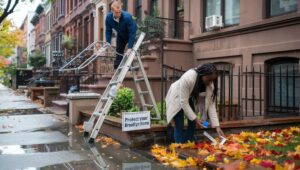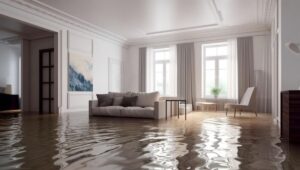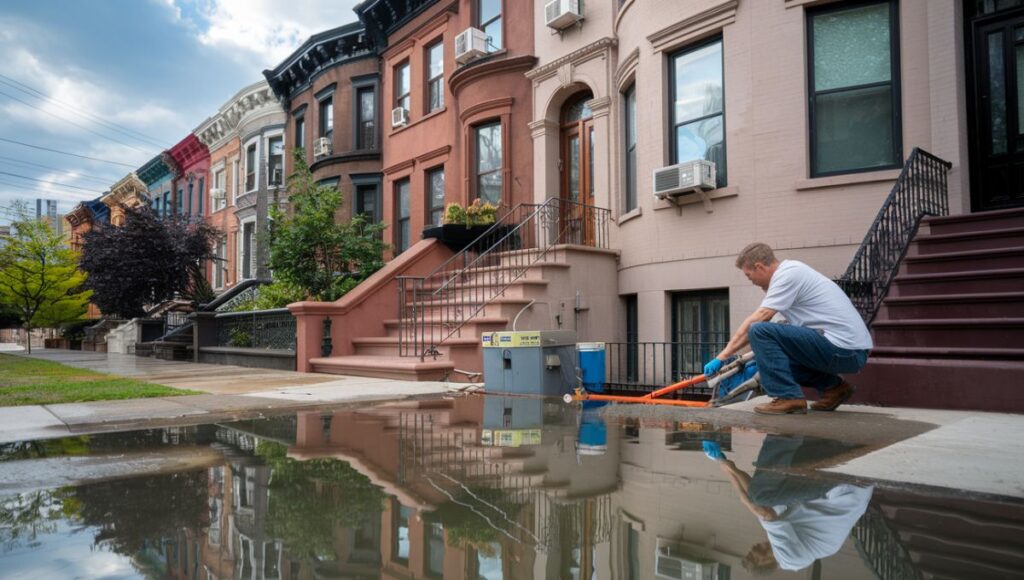As a homeowner in Brooklyn, you have unique concerns about protecting your home, and water damage is maybe the sneakiest threat of all. From the historic brownstones of Cadman Plaza to the newer construction near Rockaway Boulevard, no home is immune to the devastating effects of unwanted water entry.
A small leak today can become a catastrophic repair bill down the road, maybe reducing the value of your home and creating health hazards for your family.
Water damage isn’t just bad for your wallet—it can ruin all that you’ve accomplished. The good news? With the right preventative measures, you can save your Brooklyn home from leaks, floods, and moisture problems before they start.
Wherever you reside, in a townhouse that’s a hundred years old or an apartment home, these future 13 essential tips will help you protect your investment and guarantee your peace of mind from Brooklyn’s harsh weather conditions.
13 Key Tips to Prevent Water Damage in Your Brooklyn Home

Protecting your Brooklyn home from water damage requires staying one step ahead of the issue. The borough’s aging infrastructure, heavy weather, and floodplains all call for taking it to the extreme.
From roof repair to window sealing and sump pump installation, these tips safeguard your investment. It’s worth investing in protecting potential threats before costly repairs and a waterlogged home all year long.
Outsmart leaks, flooding, and foundation issues with these must-know techniques specifically tailored for Brooklyn residents.
1. Know Brooklyn’s Biggest Water Damage Risks
Living in Brooklyn carries with it some water damage dangers that other communities do not face. Old infrastructure, unpredictable weather patterns, and tightly packed buildings all pose threats to inhabitants.
Your biggest risks include:
- Aging water and sewer lines that can burst without warning
- Heavy downpours overwhelm drainage systems
- Winter freeze-thaw cycles that crack pipes
- Storm surges in coastal neighborhoods
- Water seepage through century-old foundations
Pay special attention if you live in flood-prone areas like Red Hook, Gowanus, or parts of Williamsburg. These neighborhoods have historically poor drainage and are more susceptible during heavy rains.
2. Inspect & Maintain Your Roof Regularly
Your roof is your first defense against water damage. Brooklyn’s weather can be brutal on roofing materials, so inspect yours at least twice yearly, especially after winter and summer.
Look for:
- Missing, cracked, or curling shingles
- Damaged flashing around chimneys and vents
- Sagging sections that might indicate water damage
- Moss or algae growth (signs of trapped moisture)
Don’t wait for leaks to appear inside your home. By then, significant damage has already occurred. Hiring Home Improvement Contractors in Brooklyn for a professional roof inspection can be a wise investment to catch issues early.
3. Keep Gutters & Downspouts Clear
Clogged gutters are a leading cause of water damage in Brooklyn homes. With our abundant trees and seasonal debris, your gutters need regular attention.
Clean your gutters:
- At least twice a year (spring and fall)
- After major storms
- When you notice water spilling over the sides
Make sure downspouts direct water at least 5-10 feet away from your foundation. Consider installing gutter guards if you’re tired of the constant cleaning – they’re particularly helpful with Brooklyn’s tree-lined streets.
4. Seal Windows & Doors Properly
Those charming brownstone windows? They’re probably letting water in during heavy rains. Check all your windows and doors for proper sealing, especially in older buildings.
Watch for:
- Cracked caulking around frames
- Warped or rotting wood
- Gaps between the window/door and the frame
- Condensation between glass panes
Re-caulk annually and replace weatherstripping when it becomes brittle or compressed. For historic homes, consider storm windows for added protection without sacrificing character.
5. Install a Sump Pump (Especially in Basements)
Brooklyn basements are notoriously damp. A sump pump can prevent water buildup during storms. If you’re unsure about the right type or size, check out the Top 10 Basement Waterproofing Service Providers in NY for expert guidance.
Choose a pump with:
- Battery backup (crucial during storms when power fails)
- Water level alarm
- Sufficient horsepower for your space
Position it at the lowest point of your basement and test it regularly. The $300-800 investment can save you thousands in potential water damage repairs.
6. Check Plumbing for Leaks & Weak Spots
Avoid Costly Water Waste!
Brooklyn’s aging pipes can hide small leaks that turn into big repair bills. Regularly checking your plumbing is one of the smartest ways to prevent water damage.
Hidden Leak Detection Tips. Early Warning Signs-
- Unexplained spikes in your water bill
- Musty smells or damp spots under sinks or behind walls
- Discolored or sagging drywall
Catching leaks early prevents mold growth and structural damage that can go unnoticed for months.
When to Call a Brooklyn Plumber
- If you notice corrosion, discoloration, or flaking on exposed pipes
- Persistent low water pressure may indicate leaks or blockages
- In multi-family buildings, recurring issues often signal system-wide problems
7. Insulate Pipes Before Winter Hits
Prevent Frozen Pipe Disasters! Brooklyn winters can freeze unprotected pipes, causing them to burst and flood your home. Insulating pipes is a cheap and effective prevention method.
Most Vulnerable Pipes in Brooklyn Homes
- Pipes running through unheated basements or crawl spaces
- Water lines in attics or exterior walls
- Outdoor spigots and sprinkler lines
DIY Pipe Insulation Step-by-Step Guide
- Use foam pipe sleeves or wrap with heat tape
- Seal gaps near pipes with caulk or spray foam
- Let faucets drip slightly during extreme cold to keep water moving
- Disconnect garden hoses before the first freeze
8. Grade Your Yard Away from the Foundation

Keep Water Flowing Out, Not In! Poor drainage can cause water to pool around your foundation and seep into your basement. Proper grading helps redirect rainwater away from your home.
How Proper Sloping Prevents Flooding
- The soil around your home should slope downward at least 6 inches over 10 feet
- This keeps water from collecting at your foundation wall
Affordable Landscaping Quick Solutions
- Extend downspouts with plastic or metal extenders
- Use mulch or gravel to build up low spots near your foundation
- Create shallow swales to direct water flow toward the street or drains
9. Install Water Leak Detectors
Smart Tech for Early Alerts! Water leak detectors can catch issues before they spiral into expensive disasters. These compact devices send alerts directly to your phone when moisture is detected.
Best Water Sensors for Brooklyn Homes
- Smart detectors like Moen Flo, Phyn Plus, or YoLink
- Choose Wi-Fi-enabled devices with automatic shutoff features
- Place them:
- Under sinks and toilets
- Near water heaters, washing machines, and dishwashers
- In your basement, especially near sump pumps
- Under sinks and toilets
10. Waterproof Your Basement
Transform Your Damp Basement for Good! Basements in Brooklyn are notorious for dampness, especially in older homes. A proper waterproofing system can eliminate moisture issues for good.
Effective Waterproofing Methods
- Interior sealants: Good for mild dampness or humidity
- Exterior waterproof membranes: Best for preventing seepage through walls
- French drains or interior weeping tile systems: Ideal for persistent flooding
Work with a local contractor familiar with Brooklyn’s soil and foundation types for the best results.
11. Maintain Appliances That Use Water
Don’t Let Your Washing Machine Flood Your Home! Appliances can cause leaks if not properly maintained. Regular inspections can stop slow leaks from becoming big messes.
Inspect Hoses & Connections
- Replace old rubber hoses with steel-braided hoses (they last longer and resist bursting)
- Check all appliance lines for signs of rust, bulging, or cracking
- Tighten loose connections and inspect under appliances for pooled water
Focus on washers, dishwashers, refrigerators with ice makers, and water heaters.
12. Know How to Shut Off Your Main Water Valve
Emergency Preparedness Saves Homes! When a pipe bursts, every second counts. Knowing how to quickly shut off your main water valve can prevent major damage.
Locating Your Water Shut-Off Valve
- Usually found in your basement, crawl space, or where the main water line enters your home
- In apartments, it may be inside a utility closet or behind an access panel
When to Shut Off Water Immediately
- A burst pipe or sudden leak
- Before leaving for an extended trip
- If a fixture is overflowing and you can’t shut it off locally
Label the valve and make sure everyone in your household knows how to use it.
13. Review Your Home Insurance Policy
Is Water Damage Covered? Don’t Get Surprised! Many Brooklyn homeowners don’t realize that standard policies may not cover common types of water damage. Understanding your coverage is crucial.
What Most Brooklyn Policies Exclude. Key Details-
- Flood damage (from rising waters or storm surges) usually requires separate flood insurance through FEMA
- Damage from slow leaks or poor maintenance may be denied
- Sudden pipe bursts are often covered, but double-check your policy language
Speak with your insurance agent annually to review coverage and consider adding riders for sump pump failure, sewer backups, or flood protection.
Final Thoughts
Prevention of water damage in Brooklyn houses requires appropriate maintenance and awareness of the potential risk factors. With these 13 tips, you can easily minimize the risk of costly water damage repair and continue to relish the value of your property. Remember that prevention is always less expensive than restoration, and some maintenance now can save you thousands down the line.
If you think your Brooklyn home has water damage or would prefer to get expert advice on preventative measures, don’t hesitate to reach our team at FH Construction.

